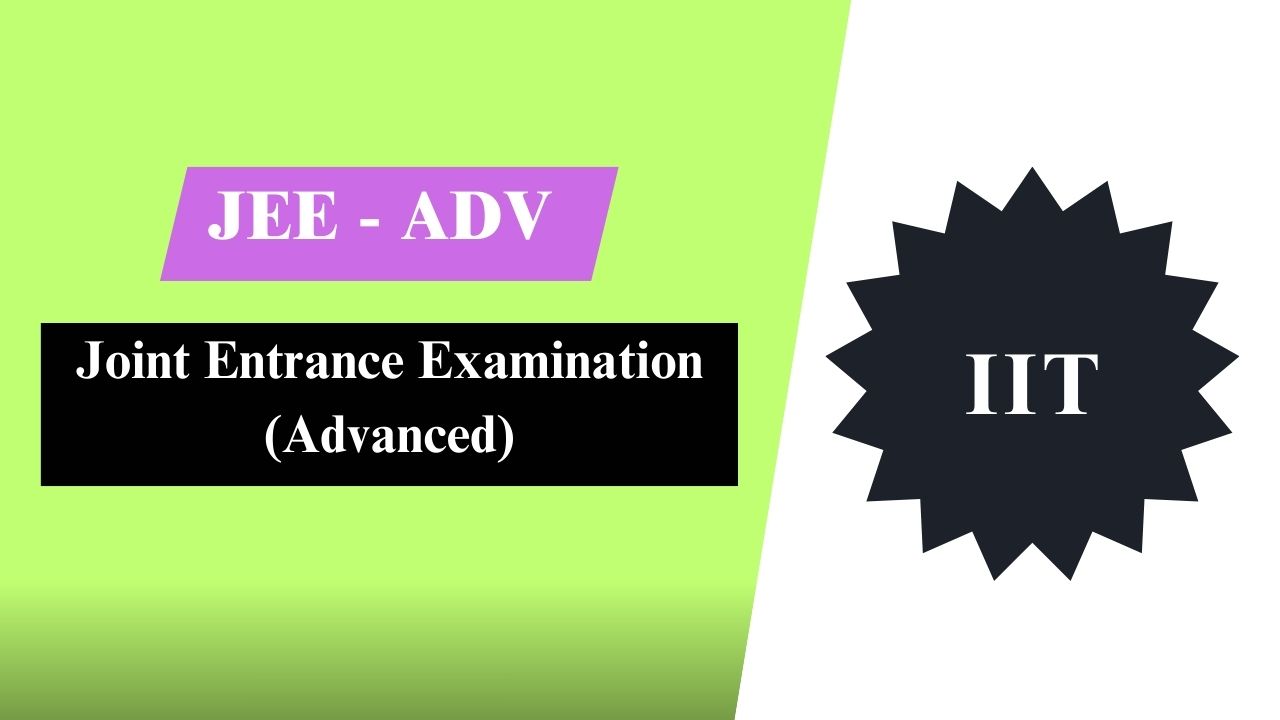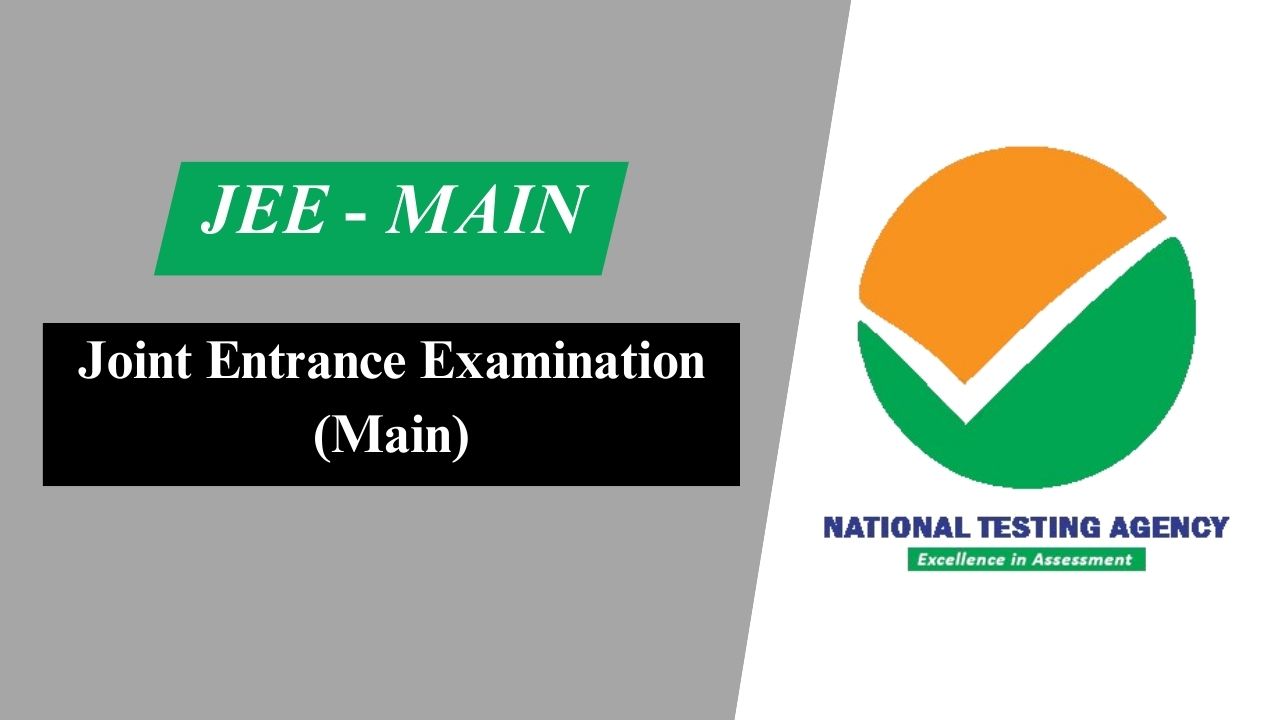What is IIT JEE Advanced Entrance Exam? - Pattern, Eligibility & Topper list

What is JEE Advanced?
The full form of JEE Advanced is Joint Entrance Examination Advanced. JEE Advanced is the second and final examination of the Joint Entrance Examination (JEE), which is conducted by the Indian Institutes of Technology (IITs) every year after the JEE Main examination. To appear in this exam it is necessary to qualify JEE Main first. It is India's most prestigious engineering entrance exam, through which candidates are admitted to undergraduate engineering courses in Indian Institutes of Technology (IITs) and other top engineering colleges in India.
JEE Advanced exam is known for its high difficulty level. This exam evaluates students' conceptual understanding, analytical ability, problem solving skills in physics, chemistry and mathematics subjects.
There are certain eligibility criteria to appear in the JEE Advanced exam, which every candidate must fulfill. To appear in this exam, candidates must first clear the JEE Main exam. Based on All India Rank (AIR) in JEE Main, top 2.5 lakh students can appear in JEE Advanced. It has reserved seats for all categories (GEN, OBC, SC, ST, EWS etc.). Online application for JEE Advanced exam has to be done separately. This registration is valid only on the official website. Unlike JEE Main, this exam is not conducted by NTA. Its responsibility is given to a designated IIT every year.
What is the JEE Advanced exam for?
JEE Advanced is for students who want to take admission in undergraduate engineering courses (B.Tech/BE) in IITs and other top engineering institutes of India. This exam is conducted by a different IIT institute every year.
What is IIT?
The full name of IIT is Indian Institutes of Technology. These institutes are institutes of higher education of national importance established by the Government of India, which provide high quality education mainly in the fields of engineering, technology, science and research. IITs are considered among the best engineering colleges in the world. The first IIT in India was established in 1951 at Kharagpur. The objective of setting up IITs was to make India technologically strong and to produce globally competitive engineers, scientists and researchers.
How to get admission in IIT?
To take admission in IITs, students have to clear the two-stage entrance exam given below:
- JEE Main - This exam is conducted by NTA.
- JEE Advanced - It is conducted by the IITs, and only the top 2.5 lakh students of JEE Main can sit for it.
Only those students who clear JEE Advanced get admission in IITs.
JEE Advanced Exam Summary
| Detail | Information |
|---|---|
| Exam Name | JEE Advanced Entrance Exam |
| Full Form | Joint Entrance Examination - Advanced (JEE Advanced) |
| Conducting Body | Indian Institutes of Technology (IIT) |
| Purpose | Admission to undergraduate engineering programs in IITs and other top institutes. |
| Target Audience | Students who have qualified JEE Main and are seeking admission to IIT. |
| Exam Level | National |
| Frequency | Once a year |
| Application Mode | Online |
| Official Website | Website |
JEE Advanced Eligibility Criteria
- JEE Main Performance: To be eligible for the JEE Advanced exam candidates must be among the top 2,50,000 All India Rank (AIR) holders in the JEE Main exam.
- Class 12th Marks: For General and OBC category minimum of 75%, while for SC/ST/PwD candidates 65%.
- Subjects requirement: Minimum of 5 subjects with PCM (Physics, Chemistry, Mathematics) being compulsory.
- Age limit: The candidate should be born on or after October 1 2000.
- Attempts limit: A maximum of 2 attempts are allowed.
JEE Advanced Exam Pattern
JEE Advanced exam is conducted as Computer Based Test (CBT). This exam is conducted in two papers, Paper 1 and Paper 2. Both these papers are based on Physics, Chemistry and Mathematics subjects. The unique aspect of JEE Advanced is that its number of questions and total marks change every year, thereby testing students' conceptual understanding and thinking ability in depth. Therefore, it is very important to understand the pattern of this exam correctly and prepare accordingly.
| Mode of Exam | Computer Based Test (CBT) |
| Number of Papers |
|
| Type of Question |
|
| Paper - 1 Subject |
|
| Paper - 2 Subject |
|
| Duration of Exam |
|
| Number of Question | Dynamic (changes every year) |
| Total Marks | Dynamic (changes every year) |
JEE Advanced Selection Process
- After the exam the result of jee advanced is declared on the official website of jee advanced.
- After the All India Rank (AIR) list is declared based on the candidates score.
- After qualifying JEE Advanced candidates have to register for counseling by JoSAA (Joint Seat Allocation Authority).
- Candidates have to fill the IIT options as per their preference. After this multiple rounds of seat allotment take place.
- After accepting the allotted seat candidates have to go to the reporting center for document verification.
- Candidates have to report to the allotted institute and complete the admission formalities.
What is JoSAA?
The full name of JoSAA is Joint Seat Allocation Authority. It is a joint body constituted by the Government of India, which conducts the seat allotment process in BTech, BE and other undergraduate courses in IITs, NITs, IIITs and GFTIs. If you have cleared JEE Main or JEE Advanced, then you have to participate in the JoSAA counseling process, so that you can select the institute and branch according to your rank and preference.
Important points related to JoSAA
JoSAA counseling starts every year in online mode after the results of JEE Main and JEE Advanced. It includes more than 100 engineering institutes. Understanding the JoSAA process and filling the options correctly is very important as it determines which college and branch you will get.
IIT & Non - IIT accepting JEE Advanced Score
If you have qualified JEE Advanced, then you have many great options besides IITs. Below is the list of institutes that accept JEE Advanced scores:
1. IIT List
| IIT | State |
|---|---|
| IIT Kharagpur | West Bengal |
| IIT Bombay | Maharashtra |
| IIT Madras | Tamil Nadu |
| IIT Kanpur | Uttar Pradesh |
| IIT Delhi | Delhi |
| IIT Guwahati | Assam |
| IIT Roorkee | Uttarakhand |
| IIT Bhubaneswar | Odisha |
| IIT Gandhinagar | Gujarat |
| IIT Hyderabad | Telangana |
| IIT Jodhpur | Rajasthan |
| IIT Patna | Bihar |
| IIT Ropar | Punjab |
| IIT Indore | Madhya Pradesh |
| IIT Mandi | Himachal Pradesh |
| IIT Varanasi (BHU) | Uttar Pradesh |
| IIT Palakkad | Kerala |
| IIT Tirupati | Andhra Pradesh |
| IIT Bhilai | Chhattisgarh |
| IIT Goa | Goa |
| IIT Jammu | Jammu and Kashmir |
| IIT Dharwad | Karnataka |
2. Non-IIT List
There are also some reputed institutes which are not IITs but give admission based on JEE Advanced score:
| Institute Name | State |
|---|---|
| Indian Institute of Science (IISc), Bangalore | Karnataka |
| Indian Institute of Space Science and Technology (IIST), Thiruvananthapuram | Kerala |
| Rajiv Gandhi Institute of Petroleum Technology (RGIPT), Amethi | Uttar Pradesh |
| Indian Institute of Petroleum and Energy (IIPE), Visakhapatnam | Andhra Pradesh |
JEE Advanced Toppers List
| Toppers Name | Passing Year | IIT | Discipline |
|---|---|---|---|
| Anumula Jithendar Reddy | 2010 | Bombay | Electrical Engineering |
| Prudhvi Tej Immadi | 2011 | Bombay | Electrical Engineering |
| Arpit Agarwal | 2012 | Delhi | Computer Science (Honours) |
| Pallerla Sai Sandeep Reddy | 2013 | Bombay | Computer Science (CS) |
| Chitraang Murdia | 2014 | Bombay | Computer Science (CS) |
| Satvat Jagwani | 2015 | Bombay | Computer Science Engineering (CSE) |
| Aman Bansal | 2016 | Bombay | Computer Science (CS) |
| Sarvesh Mehtani | 2017 | Bombay | Computer Science Engineering (CSE) |
| Pranav Goyal | 2018 | Bombay | Computer Science (CS) |
| Kartikey Gupta | 2019 | Bombay | Computer Science (CS) |
| Chirag Falor | 2020 | Bombay | (Skip IIT Bombay, secured admission at MIT) |
| Mridul Agarwal | 2021 | Delhi | Computer Science Engineering (CSE) |
| R K Shishir | 2022 | IISc | B.Tech in Maths and Computing Programme |
| Vavilala Chidvilas Reddy | 2023 | Bombay | Computer Science Engineering (CSE) |
| Ved Lahoti | 2024 | Bombay | Computer Science Engineering (CSE) |
List of BE/BTech Through JEE Advanced
Not all courses are available in every IIT. Check the availability of the course from the official website of the respective IIT or the JoSAA portal.
- Aerospace Engineering
- Automobile Engineering
- Chemical Engineering
- Civil Engineering
- Computer Science and Engineering
- Electrical Engineering
- Electronics and Communication Engineering
- Industrial Engineering
- Information Technology
- Instrumentation Engineering
- Textile Engineering
- Mechanical Engineering
- Metallurgical Engineering
- Petroleum Engineering
Jee Advanced Facts
Below are some interesting facts about JEE Advanced.
- Visionary Leader: Nalini Ranjan Sarkar was the first to recommend the establishment of IITs on the model of the Massachusetts Institute of Technology (MIT).
- New setter every year: JEE Advanced is conducted by different IITs every year.
- Early IIT Admission Process: Before 1961 candidates were admitted to IITs based on their academic performance and interviews.
- Origin of JEE Advanced: JEE Advanced was initially known as IIT-JEE which established in 1961.
- Transition in IIT-JEE: IIT-JEE was changed to JEE Advanced in 2013.
- Eligibility: Only the top performing candidates in JEE Main are eligible to appear for JEE Advanced.
- IIT Kharagpurs Role: From 1951 to 1958 IIT Kharagpur was the only IIT in India where candidates were selected for engineering programs.
JEE Advanced Advantages
- Prestige: JEE Advanced is not only one of the toughest exams in India but also one of the most challenging exams in the world. Cracking this exam is incredibly difficult and only a few students succeed each year. The level of difficulty is so high that students must dedicate themselves completely to their preparation. Due to the complexity of the exam and its vast syllabus only a handful of students out of the lakhs who appear for the exam every year are able to secure admission in prestigious institutes like the IITs.
- Gateway of Top IITs: Clearing JEE Advanced opens the door to admission in India's top institutes, including IITs which offer world class education and research facilities.
- Advanced Conceptual Testing: This exam tests candidates on a deeper level, not just the surface. It enhances a candidates problem solving abilities and analytical skills which are crucial for success in the field of science and technology.
- Internship and Career Opportunities: Graduating from an IIT provides candidates with numerous opportunities for internships and high-paying jobs both within india and internationally with prestigious companies and research institutions.
JEE Advanced Disadvantages
- Performance on JEE Main: Candidates cannot directly apply for JEE Advanced. To be eligible they must secure a position within the top 2.5 lakh All India Rank (AIR) in JEE Main. Only then can they appear for JEE Advanced.
- Hard Work: The level of difficulty in JEE Advanced is exceptionally high that students must dedicate themselves completely to their preparation.
- Dependence on Coaching: Many students rely on coaching classes to prepare for JEE Advanced. However the fees for these coaching institutes are often quite high creating a financial burden for many families.
- Limited Seats: The number of seats available for admission to IITs is limited. Although lakhs of students apply for JEE Advanced every year the number of seats in a single IIT is usually in the thousands or fewer, meaning many qualified candidates are unable to secure admission.
- Tough Competition: The pass percentage of JEE Advanced is generally around 20% to 30%, meaning only 20 to 30 students out of every 100 are able to clear this challenging exam.
Quick Links
- Common Admission Test (CAT) Exam
- Central Teacher Eligibility Test (CTET) Exam
- IISER Apptitude Test (IAT) Exam
- JEE Advanced Exam
- JEE Mains Exam
- National Entrance Screening Test (NEST) Exam
- National Talent Search Examination (NTSE) Exam
- RRB Junior Engineer (JE) Exam
- RRB Non-Technical Popular Categories (NTPC) Exam
- SBI Junior Associate (Clerk) Exam
- SBI Probationary Officer (PO) Exam
- Staff Selection Commission Combined Graduate Level (SSC CGL) Exam
- Staff Selection Commission Multi Tasking Staff (SSC MTS) Exam
- SSC CGL Assistant Audit Officer (AAO)
- SSC CGL Assistant Enforcement Officer (AEO)
- SSC CGL Assistant Section Officer in Central Secretariat Service (ASO in CSS)
- SSC CGL Assistant Section Officer in Ministry of External Affairs (ASO in MEA)
- CBI Sub Inspector (SI)
- SSC CGL Central Excise Inspector
- Indian Administrative Service (IAS)
- SSC CGL Income Tax Inspector (ITI)
- SSC CGL Junior Statistical Officer (JSO)
- SSC CGL Preventive Officer (PO)
- RRB NTPC Railway Station Master
- BE/BTech Aerospace Engineering Course
- Bachelor of Business Administration (BBA) Course
- Bachelor of Computer Applications (BCA) Course
- Bachelor of Commerce (B.Com) Course
- Bachelor of Computer Science (BCS) Course
- Bachelor of Hotel Management (BHM) Course
- Bachelor of Science in Biotechnology (BSc Biotechnology) Course
- Bachelor of Science in Chemistry (BSc Chemistry) Course
- Bachelor of Science in Forensic Science (BSc Forensic) Course
- Bachelor of Science in Microbiology (BSc Microbiology) Course
- Bachelor of Science in Nursing (BSc Nursing) Course
- BE/BTech in Civil Engineering Course
- ITI Computer Operator and Programming Assistant (COPA) Course
- ITI Cutting & Sewing (Tailoring) Course
- ITI Electrician Trade Course
- ITI Electronic Mechanic Course
- ITI Fitter Trade Course
- ITI Hair & Skin Care (Beautician) Course
- ITI Digital Photography Course
- ITI Plumber Course
- ITI Surveyor Course





